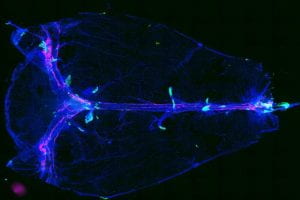Dr. Guoyan Zhao awarded R21 from the NIH to study neurodegenerative disease (Links to an external site)
The title of the award is “Evaluating novel transcription factors in regulating astrocyte identity, reactivity, and their roles in neurodegenerative disease pathogenesis”.
How does waste leave the brain? (Links to an external site)
Jonathan Kipnis, PhD, and fellow scientists at Washington University School of Medicine in St. Louis have found passageways that connect the brain to vessels that carry fluid waste out of and away from the brain. Learn more
Supporting Lymphatic Systems Research with Heart and Hope
We are honored to share that we recently received a generous donation from a remarkable young girl who organized the “Kick Off The Sickness” tournament to support lymphatic research in our center. Her dedication and compassion have raised over $8k for lymphatic systems research at the BIG Center at WUSM. more
Age-related alterations in meningeal immunity drive impaired CNS lymphatic drainage (Links to an external site)
The meningeal lymphatic network enables the drainage of cerebrospinal fluid (CSF) and facilitates the removal of central nervous system (CNS) waste
Discovery of T cells’ role in Alzheimer’s, related diseases, suggests new treatment strategy (Links to an external site)
Findings, in mice, open up drug development possibilities for brain diseases linked to tau protein
Parenchymal border macrophages regulate the flow dynamics of the cerebrospinal fluid (Links to an external site)
Macrophages are important players in the maintenance of tissue homeostasis. Perivascular and leptomeningeal macrophages reside near the central nervous system (CNS) parenchyma, and their role in CNS physiology has not been sufficiently well studied.
Rejuvenated immune cells can improve clearance of toxic waste from brain (Links to an external site)
Findings in mice suggest new therapeutic approach to Alzheimer’s, other age-related diseases
P&I faculty awarded $15M from NIH for Alzheimer’s research (Links to an external site)
Three faculty members in the Department of Pathology & Immunology at Washington University School of Medicine were recently awarded a multi-year, multi-million dollar grant to research the aging brain.
Study points to new approach to clearing toxic waste from brain (Links to an external site)
“We were studying this very wonky basic science question — ‘How do proteins get made?’ — and we noticed this funny thing,” said senior author Joseph D. Dougherty, PhD, a Washington University professor of genetics and of psychiatry, and Sapkota’s former mentor.
ICTS Pilot Funding Drives Research on Neurodegenerative Diseases (Links to an external site)
In 2019, Guoyan Zhao, PhD, assistant professor in the Department of Neuroscience at Washington University School of Medicine in St. Louis, utilized a unique ICTS pilot funding project to help develop her research on neurodegenerative diseases.
Guardians of the brain: how a special immune system protects our grey matter (Links to an external site)
The nervous and immune systems are tightly intertwined. Deciphering their chatter might help address many brain disorders and diseases.
Zhao receives grant to study proteomics in the brain (Links to an external site)
Guoyan Zhao, assistant professor in the Department of Neuroscience at Washington University School of Medicine in St. Louis, received a $433,000 grant from the National Institutes of Health (NIH) to apply a cutting-edge imaging technology to study subcellular features of brain tissue from Alzheimer’s patients.


